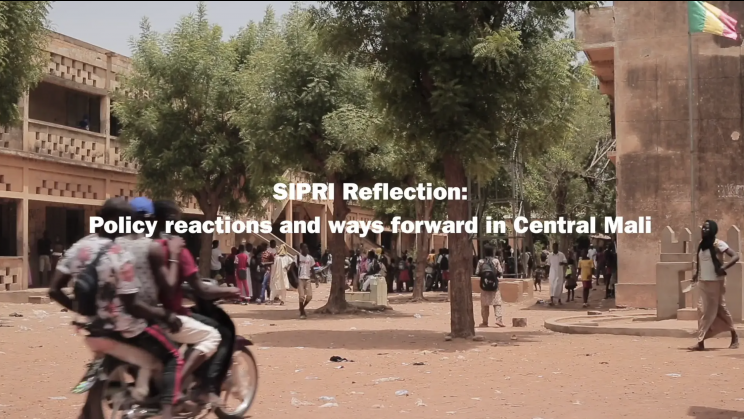
Today, SIPRI launches a new Reflection film, capturing the reactions of key international and Malian actors to the research findings in SIPRI’s latest report on Mali, ‘The Challenges of Governance, Development and Security in the Central Regions of Mali’.
The film is accompanied by a series of short Spotlight interviews presenting the distinct voices of the policymakers and practitioners onsite in Mali who feature in the film. These are:
- HE Bart Ouvry, Ambassador and Head of the Delegation of the European Union (EU) in Mali
- Giancarlo de Picciotto, Head of International Cooperation at the Swiss Agency for Development and Cooperation in Mali
- HE Professor Dioncounda Traoré, former acting President of Mali (April 2012–September 2013) and High Representative for Central Mali
- Jo Scheuer, United Nations Development Programme (UNDP) Resident Representative in Mali
- HE Boubacar Gaoussou Diarra, Permanent Secretary of Central Mali’s Crisis Management Political Framework
- Johannes van der Klaauw, Deputy Humanitarian Coordinator for Mali, UN Office for the Coordination of Humanitarian Affairs (OCHA)
- Dr Mamadou Bodian, Researcher, SIPRI Sahel and West Africa Programme
Watch the SIPRI Reflection film and Spotlight interviews on SIPRI’s YouTube channel and on Facebook.
Absent state functions in Central Mali are the key challenge
SIPRI’s most recent research finds that in Central Mali, where state authorities are relatively absent, the people turn to non-state service providers, non-governmental organizations (NGOs) or non-state security actors and militia groups.
According to HE Bart Ouvry, Ambassador and Head of the Delegation for the EU in Mali, the price of insecurity is very high. For him, the SIPRI study is valuable because it helps to achieve a better understanding of the challenges people are facing.
Giancarlo de Picciotto, Head of International Cooperation at the Swiss Agency for Development and Cooperation in Mali, explains that these NGOs or non-state security actors fill a void which the Malian state has left vacant for many years.
Johannes van Der Klaauw, Deputy Humanitarian Coordinator for Mali at UN OCHA, stresses that non-state security actors exploit the situation, diminish access to land, waters and fishing grounds. He also finds it worrying because these conflicts create displacement of people and humanitarian needs.
HE Professor Dioncounda Traoré, former acting president of Mali and High Representative for Central Mali, states that looking after humanitarian needs is precisely his mission. He sees two challenges: the intra- and inter-community problems and jihadism, and agrees that the state must assume a role again. As that requires a minimum level of security, the necessary step is military action against the jihadists. He argues that the main threat now is no longer between the populations themselves; the biggest challenge is jihadism.
Jo Scheuer, UNDP Resident Representative in Mali, summarizes that it is simply very difficult for many actors to access these areas in Central Mali, and the biggest obstructing factor is indeed the security situation.
HE Boubacar Gaoussou Diarra, Permanent Secretary of Central Mali’s Crisis Management Political Framework, stresses that the government has fully understood the need to bring peace and security to Central Mali. The question is: how do you achieve that? Johannes van Der Klaauw proposes a holistic approach, which puts the state at the centre of the action and brings back administration, justice and security to the region.
Malian and international actors remain very committed
For HE Professor Dioncounda Traoré, Central Malian High Representative, the focus needs to be on the quality of state operations. Not simply more governance, he says, but a ‘better state’, a ‘useful state’ that is fair, transparent and respects human rights.
HE Bart Ouvry, EU Ambassador, gives assurance that EU member states remain committed and consider restoring stability to be a crucial goal. The reinstallation of public services in the region is a key element, he says, as state legitimacy is gained through the services the state can deliver to the people. He argues for pragmatism and finding solutions based on the situation on the ground, people’s expectations and what is possible.
Jo Scheuer, UNDP, emphasizes that within UNDP’s commitment to Central Mali, strengthening the rule of law is a cornerstone and key strategic entry point. Yet he also refers to the need for patience, as it will take time.
Dr Mamadou Boudian, Researcher, SIPRI Sahel and West Africa Programme, concludes that the research leaves room for hope, because the findings show that people really want the state back. And his hope lies in the international community, that they can empower the state to fulfil the needs of the people.
About SIPRI’s films
SIPRI has developed various film types for different audiences and purposes. This SIPRI Reflection film is part of SIPRI’s film series which aims to deliver thoughtful and insightful analysis, driven by SIPRI experts, to guide viewers in key themes of peace and security. Through the overview film, in combination with the subsequent series of individual interviews—filmed in Bamako, Mali—SIPRI strives to bring regional perceptions, voices and views to the global debate. Watch more films over at SIPRI’s YouTube channel.
For editors
SIPRI’s current work on Central Mali is part of a three-year project ‘Mali-Centre for Security and Development’. The project is funded by the EU and implemented by SIPRI and its partner Point Sud.
Access previous publications and films by SIPRI on Mali and the Sahel:
Film series: SIPRI Reflection: The complexity of conflict and peacebuilding in Central Mali
Publication: ‘Hand in Hand’: A Study of Insecurity and Gender in Mali
Publication: The Challenges of Governance, Development and Security in the Central Regions of Mali
Media contacts
For information or interview requests contact Alexandra Manolache (alexandra.manolache@sipri.org, +46 766 286 133) or Stephanie Blenckner (blenckner@sipri.org, +46 8 655 97 47).